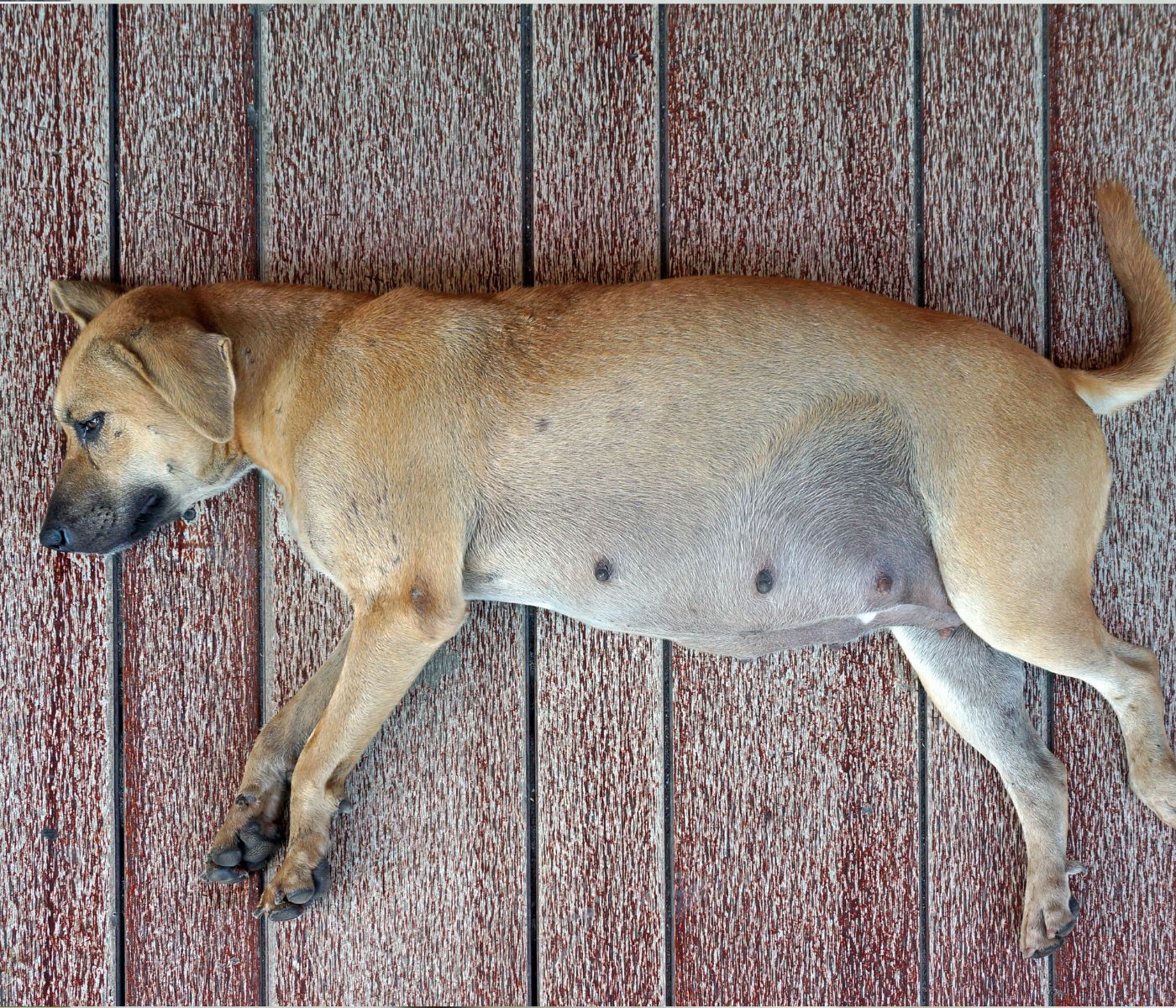Dogs are wonderful pets, but they can also be very messy. If you have a pregnant dog, it’s important to know what to do and how long your pup will be in the birthing process.
In this article, we’ll discuss the signs that your Dog might be pregnant and what steps you should take when it comes time for giving birth.
Dogs can become pregnant at any time of the year, but they often give birth in the spring and summer. This is because female dogs are more fertile during warmer months when daylight hours are longer.
Pregnancy lasts approximately 60 days, but this can vary depending on the breed and size of your Dog.
Larger dogs tend to have longer pregnancies than smaller ones. Some dogs give birth naturally while others require a C-section or surgery.
If you have a female dog, it’s important to keep an eye out for signs that she might be pregnant. If your Dog is showing some of these symptoms, take her to the vet as soon as possible!
Signs that your Dog is Pregnant:

- Your Dog’s nipples become larger and darker.
- She will have an increased appetite, especially in the morning or after a nap.
- She’ll start sleeping more and may even sleep in odd positions.
- She will have a swollen belly and may even begin lactating.
- She’ll have mood swings or become more affectionate than usual.
- Your Dog may also start cleaning herself more often and chewing on things she wouldn’t normally eat.
If you think your Dog is pregnant, contact your vet right away! If you want to prevent pregnancy in the future, talk to your vet about birth control options.
What to do if your Dog is pregnant?

If you suspect your Dog is pregnant, the best thing to do is keep her calm and quiet. She will need plenty of food and water, so ensure she has both.
She may also need more exercise than usual, so be sure to keep her on a leash when walking.
If you have other dogs in the household, be sure they are vaccinated and separated from your pregnant Dog until she has given birth. You will also want to ensure that all your pets are up to date on their flea medication.
If your Dog is pregnant and you are planning to have her spayed, talk to your vet about scheduling the procedure. You may also want to consider getting her vaccinated for distemper and hepatitis.
This is especially important if she will be going outside in an area where other animals roam freely.
If possible, keep her in a clean, warm place with soft bedding (a thick blanket or rug). Talk to your vet if you are concerned about your Dog’s health. Your vet can check for pregnancy and recommend a course of action if there is one.
Make sure that she has a clean water bowl and plenty of fresh air around her nest area—this can help prevent any irritable behaviors caused by hormones.
How Long are Dogs Pregnant?

In general, dogs are pregnant for an average of 63 days. But this can vary from 50 to 70 days. The first week is the most critical time for the puppies and when mother dogs are at their most vulnerable.
The first stage of a dog’s pregnancy lasts two weeks after breeding and 42 days after breeding (or eight weeks). In this period, a female will produce antibodies that protect her pups from infection during birth and breastfeeding.
The second stage ends 42 days after breeding (or eight weeks). It’s usually when you see your puppy moving around more frequently than usual in its box or crate; if you don’t see evidence of movement through this stage, something may be wrong with either mom or pup!
What to do when your Dog is Giving Birth?

When your Dog is giving birth to her puppies, it is important to allow her to do so in a quiet and stress-free environment.
You should be observing your Dog enough that you know she is safe and that her labor appears normal without adding to her stress levels by adding too many smells or sights into the equation.
You shouldn’t touch the puppies until they breathe independently (usually within 10-15 minutes).
You can help stimulate them by rubbing gently across their back with a washcloth or cloth diaper; this will wake them up from being still at birth and allow them time for air before meeting you.
If you are unsure what is happening, it’s best to leave the room and get help from someone who’s had experience with a dog giving birth. You don’t want to interfere with nature unless you have no choice.
Health Signs to Watch for while your Dog is Giving Birth:
If your Dog is pregnant, you should watch for these signs:
- Panting. Your Dog will probably be panting more than usual. She may also be licking her private parts or whining in discomfort as she goes through contractions.
- Vomiting. Some dogs may vomit during labor, especially if they have an upset stomach. If your Dog is vomiting and not eating, she may be in pain or have an infection.
- Diarrhea or constipation. Diarrhea can signify that the mother has eaten something bad or is stressed out. Constipation can also indicate stress or illness since pregnant dogs tend to slow down with their eating habits during gestation periods.
- Contractions. This can happen at any time during pregnancy and usually comes out of nowhere—your Dog might even wake up from sleep during a contraction! If you notice that your pup is having contractions, try to relax them by rubbing their belly with a towel or blanket until they stop (dogs often have lots of energy when giving birth).
- Restlessness/irritability/aggression towards others (especially children) around the house if there are no other dogs close by who could cause trouble for her family during this period; otherwise, this behavior usually subsides after delivery occurs.”
How to Take Care of Newborn Puppies?
To take care of newborn puppies, you should keep them warm. You can use a heating pad and place it in a safe place where your Dog can’t get too hot or cold.
If you leave him alone with the pup, he will be more likely to heat his body on its own without assistance.
If your puppy is chilled out, put him inside an airing cupboard or somewhere warm, like an oven (make sure there’s no smoke coming out).
Ensure that nothing touches their skin when inside because this could cause skin irritation which may lead to infection later down the line!
You should also ensure that no drafts encounter their eyes and ears. These areas are very delicate at this stage, so if there are any small cracks, clean them carefully using cotton wool soaked in warm water until all traces have gone away completely!
FAQs:
Q: Do dogs need to be bathed after giving birth?
A: Yes, you should bathe your Dog after she has given birth. This is because she will have been in contact with her puppies and may have gotten some of their fur on her coat. Bathing will also help remove any bacteria from the mother and prevent infection from spreading to the puppies.
Q: What does a pregnant dog need?
A: You must provide your Dog with everything she needs during pregnancy. This means giving her extra food and water, as well as giving her a comfortable place to sleep.
Q: How many times should my puppy be bathed?
A: You should bathe your puppy every time he gets dirty (after playing outside or rolling in something smelly).
Q: Can you give your dog milk while pregnant?
A: While it is true that dogs can digest cow’s milk, it is not recommended that you give her any while she is pregnant because it can cause diarrhea in both her and her puppies and malnutrition.
Q: What not to give a pregnant dog?
A: You should not give your dog ice cream, chocolate, or any foods with caffeine. These things can cause miscarriage and birth defects. You should also avoid giving your Dog raw meat because it can contain bacteria that can make her sick.
Q: How long does it take for a dog to have puppies?
A: A dog’s gestation period is usually 63 days from the time she gets pregnant until she gives birth. However, this can vary depending on the breed and even her age.
